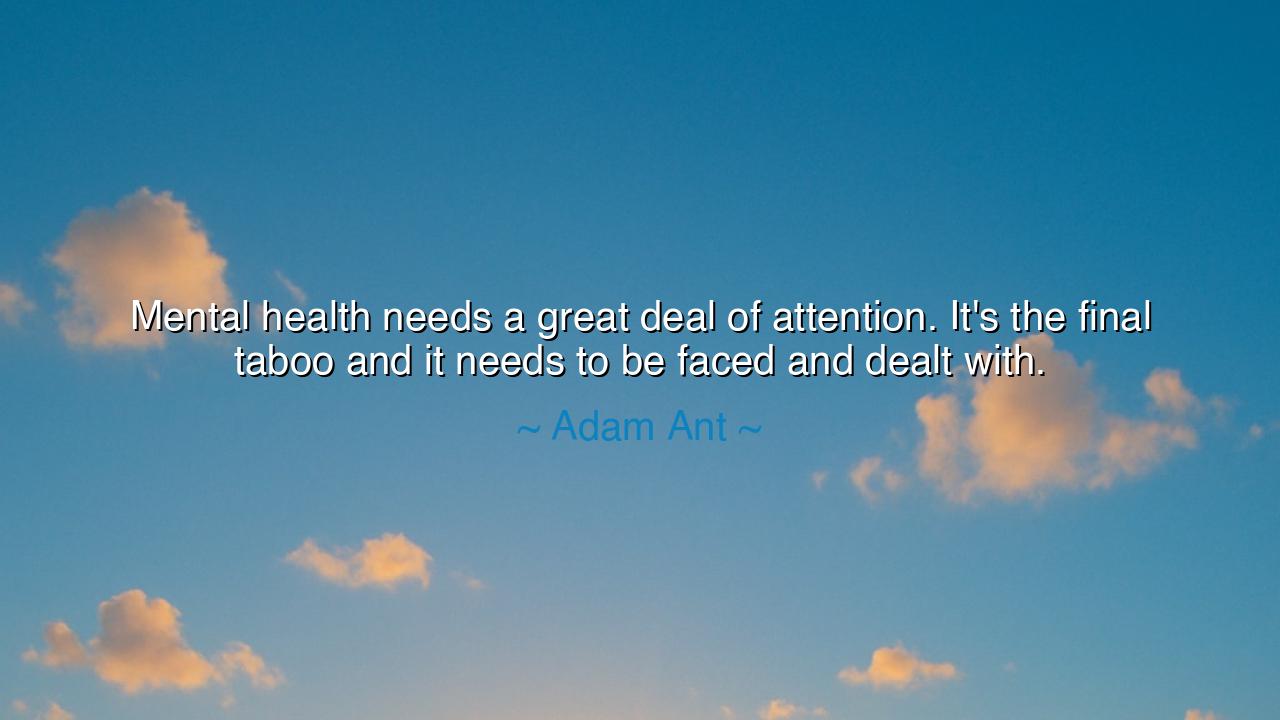
Mental health needs a great deal of attention. It's the final
Mental health needs a great deal of attention. It's the final taboo and it needs to be faced and dealt with.






When Adam Ant declared, “Mental health needs a great deal of attention. It’s the final taboo and it needs to be faced and dealt with,” he spoke not merely as a musician but as a man who had walked through fire. His words carry the weight of lived suffering, of invisible wounds that the world often refuses to see. For centuries, societies have spoken of strength as something visible—muscles, endurance, victory in battle—but seldom of the unseen courage it takes to face one’s own mind. In naming mental health as the final taboo, Adam Ant unveiled a truth as old as humanity itself: the greatest battles are fought not on the fields of war, but within the chambers of the soul.
In the ancient world, philosophers like Seneca and Epictetus spoke of mastering the self, yet even they knew the fragility of the human spirit. To tend to the mind was considered noble; to lose oneself to despair was considered shameful. Over the centuries, this silence hardened into stigma, until suffering minds were hidden away behind closed doors and whispered about as if cursed. What Adam Ant called for was a revolution of compassion, a breaking of that silence. To “face and deal with” mental health is to lift the veil from the hidden wounds of the world and declare that they too deserve healing, attention, and love.
There is a certain heroism in confronting mental pain. It is the heroism of the unseen warrior, the one who rises each morning despite the weight that crushes the chest, who dares to speak of darkness in a world that celebrates only light. In the modern age, where we prize appearance and productivity, to admit vulnerability is an act of defiance. Adam Ant himself faced bipolar disorder, enduring breakdowns and public humiliation. Yet through that storm, he spoke—not in bitterness, but in truth. His life became a testimony that even the broken can teach others how to heal, and that acknowledgment is the first act of courage.
Think of Abraham Lincoln, the great emancipator, who carried within him a melancholy so profound that friends feared for his life. Yet from that sorrow, he drew empathy, patience, and wisdom that shaped a nation. His darkness did not destroy him; it deepened him. So too must we learn that mental struggle is not weakness but the crucible of strength. The flame that torments the mind may, if faced bravely, forge a soul of unbreakable compassion.
When Adam Ant speaks of “attention,” he does not mean pity or fleeting awareness. He means deliberate care—listening, understanding, creating systems that heal rather than judge. Modern medicine has advanced, yet the stigma remains: a shadow cast by ignorance and pride. To destroy that taboo, we must learn to speak of the mind as openly as we speak of the body. No one hides a broken bone in shame; so why should one hide a broken heart or a weary spirit? Only through truth and openness can society move from mere survival to collective healing.
Let us then remember: silence has never cured suffering. The ancients taught that diseases left untreated fester and spread, and so it is with the wounds of the mind. The unspoken pain of one generation becomes the silent burden of the next. To “deal with” mental health is not simply to medicate or diagnose—it is to restore dignity to the suffering, to teach every soul that seeking help is an act of bravery, not defeat.
Thus, the words of Adam Ant echo as both warning and promise. If humanity continues to avert its eyes from the unseen battles, it will remain chained by fear. But if it dares to confront the taboo, to speak of depression, anxiety, trauma, and grief without shame, it will open the door to a gentler, wiser world. Every age has its unspoken truth; ours is the mind. And until we honor it, we will never be truly free.
Final Lesson: True strength lies not in hiding pain but in facing it. To speak openly of one’s struggles is to dismantle the walls of stigma for others.
Practical Actions: Listen without judgment to those who suffer. Educate yourself and others about mental health. Seek help when you need it, without shame. And most of all, treat every act of honesty about pain as a victory of light over silence—for in that courage lies the salvation of the human heart.






AAdministratorAdministrator
Welcome, honored guests. Please leave a comment, we will respond soon